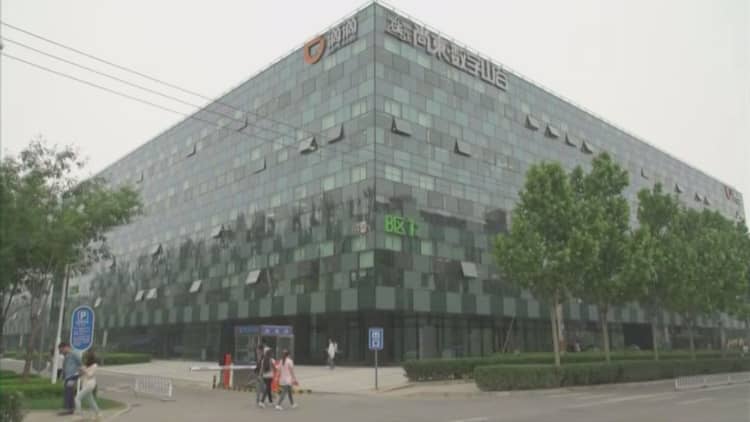
Didi Chuxing, Uber's rival in China which Apple invested $1 billion into, has denied reports that it is planning an initial public offering (IPO).
"We currently have no IPO plan, so there's no point of talking about location or schedule," a spokesperson for the ride hailing app told CNBC by email.
Citing unnamed sources, Bloomberg Monday reported that Didi was planning a flotation in New York next year. No decisions had been made regarding exchanges or banks yet, it added.
A separate story from Reuters, also citing unnamed sources, suggested the IPO would be in 2018 in the U.S. and the company has ruled out a flotation in China.
Formerly known as Didi Kuaidi, the Chinese firm has secured funding from top-flight backers in recent years. Aside from Apple, which announced its backing late last week, Didi also counts Alibaba and Tencent among its investors, placing its valuation north of $20 billion.
If Didi's U.S. IPO does pan out, it would be the biggest listing by a Chinese company since Alibaba's 2014 offering, Bloomberg's report noted.
A number of Chinese technology companies have managed to raise large rounds recently. Ant Financial, the affiliate of Chinese e-commerce giant Alibaba that runs Alipay, at a valuation close to $60 billion.
Many start-ups want to remain private for longer given the volatility in the stock market as well as the availability of capital. Didi Chuxing's rival Uber, which is the most valuable private tech company in the world, recently said its planning to hold off from a flotation.
"I'm going to make sure it happens as late as possible," Uber chief executive Travis Kalanick, told CNBC in an interview in March.
The taxi app battles in China are fierce. Didi Chuxing claims it commands a 99 percent market share in China's taxi-hailing market, but it is still carefully watching Uber's expansion on the mainland. Uber meanwhile said it is losing over $1 billion a year in China but is expecting that in two years' time it will start to see parts of China start to be profitable.
But the U.S. firm is looking for ways to gain greater presence—it recently announced it was rolling out a facial recognition feature in to prevent fraud.
There are currently no publicly-traded companies similar to Uber or Didi. If the Chinese start-up floats first it could set a benchmark for further IPOs - including Uber's.
"Whoever goes public first sets the market for that industry, so Uber is actually going to have a good idea of what their likely valuation is based on this," Dale Huxford, corporate finance lawyer at Squire Patton Boggs, told CNBC by phone.
"That will let them know when a good time to go public is."
-Additional reporting by Eunice Yoon


